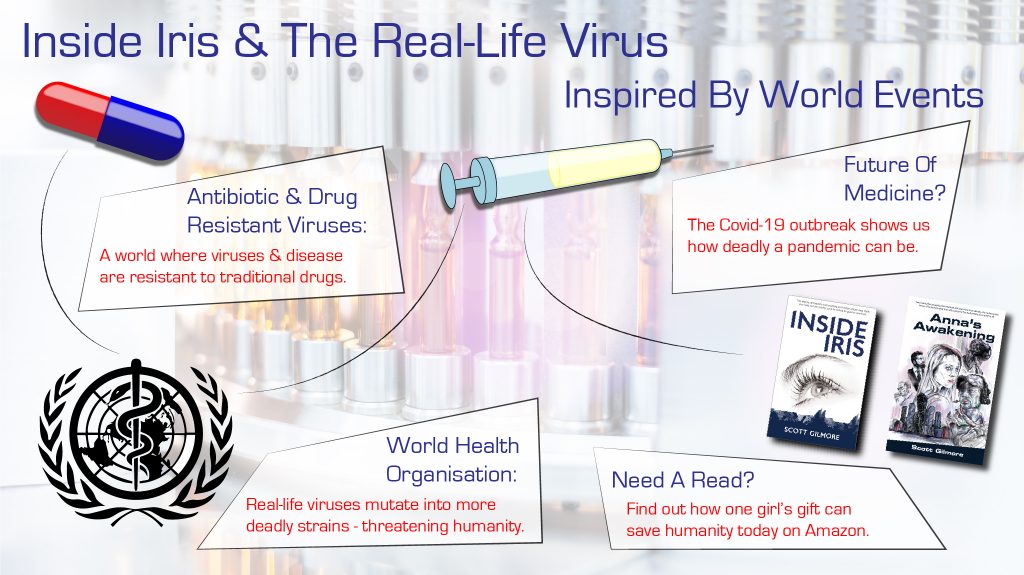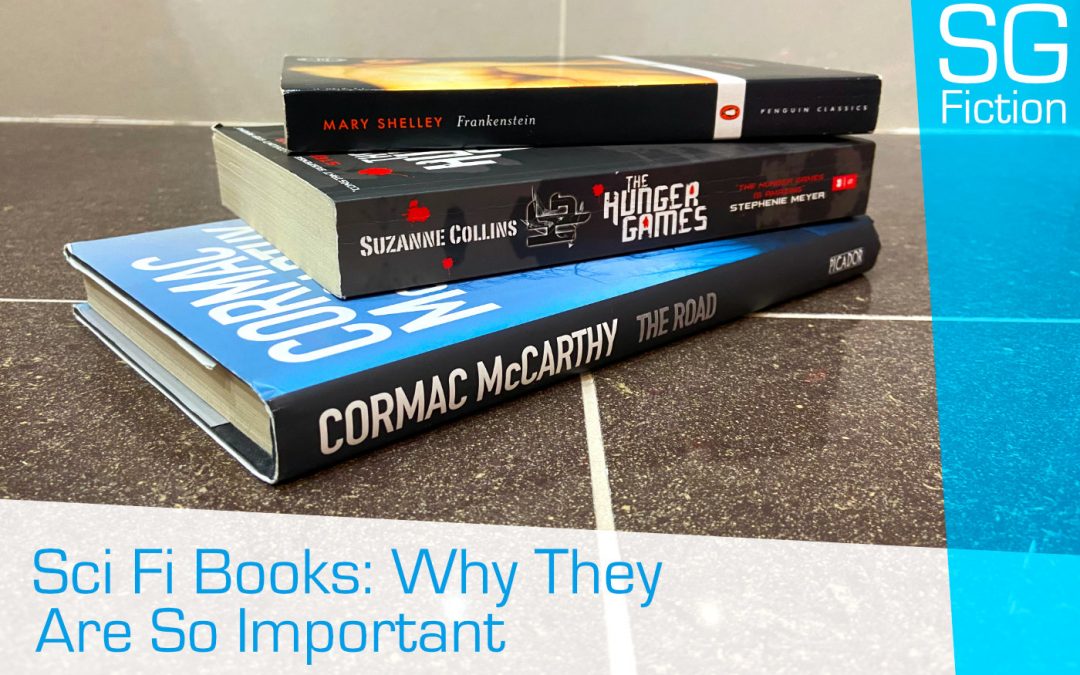Sci fi Books: Why They Are So Important & Make You Question The World!
Sci fi books and the genre as a whole are extremely important to society both in the present and the future. As a sci fi author, here’s why I believe they are a necessity.
In this Sci Fi Books blog article, you will find information on these areas:
- How sci fi is a looking glass showing you a world in the future that can inspire you as a writer and make you think deeper,
- Why biotech research and advancements can give sci fi readers and writers a lot of inspiration for novels and ideas to consider,
- How space travel helps us to look beyond our world, giving us desires to explore the stars,
- Why dystopian societies show us how worlds can go wrong at times and share warnings for what could happen,
- How a viral pandemic could ravage a species so we can prepare against such an event happening,
- Why questioning the world is important in literature and as a citizen, so we can make educated decisions on what is around us.
Read the rest of the Sci Fi Books blog article to learn why the genre is so important to us as readers.
Sci fi books are vital for so many reasons. They are not considered to be fodder for people to poke fun at as being the works of fantasists and conspiracy theorists. Instead, they are central to how we are able to explore technologies, ideas and possible advancements in society in a theoretical manner.
From multiple science fiction sources, we have seen how what was once considered fantasy or fiction is now starting to creep into the real world of consumerism. With items like:
- The Star Trek Communicator – Flip phones,
- Twenty-Thousand Leagues Under The Sea’s Nautilus – Modern day submarines,
- Multiple sources using video calls – Modern day Skype and FaceTime,
- Multiple sources predicted driverless cars – Modern day Tesla and Google tests.
It is clear that the visionary authors and film makers from years ago had ideas that have now become a reality. It is most likely that modern day scientists and engineers were inspired by the imaginations of science fiction authors from years ago. However, the fact remains that we are moving into a technological ear where these ‘dreams’ are more likely to become a reality.
The days ahead can appear filled with prosperity and hope for some. On the other hand, they can look dim and filled with uncertainty for others. Either way, we are moving forward towards the future that awaits us and I feel it is up to sci fi books authors to consider the questions of today and write about them for many reasons.
This is precisely the approach I took when I wrote both Inside Iris and Anna’s Awakening. The first two parts of my science fiction trilogy, The IRIS Trilogy, were my way of shining a light onto the world of viral pandemics, antibiotic resistance and whether medical ethics are relaxed in times of great need or crisis.
In this Sci Fi Books creative writing blog, I want to share why I feel science fiction novels are vital resources for artists to use for entertainment. I also feel we need to show readers a world where our technological or medical dreams become a nightmare. Only then can we show society what could happen if things didn’t go according to plan.

Sci Fi Books: Peering Through The Looking Glass
Ever since I was a child, I was fascinated with the ideas put forward in science fiction novels or movies. I would find myself captivated by the worlds, characters and settings that were displayed before me.
Living in the twenty-first century is an exciting time for us as a species. We can see how many of the ideas that previous science fiction authors presented to us years before are becoming a reality.
As the author of science fiction novels in 2020, I look to the future and can’t help but feel like I am peering through a looking glass to where many strange and somewhat uncomfortable events or ideas exist. The only difference is that the technologies and ideas that we present to our readers in 2020 may stand a higher chance of becoming reality – and at a more rapid rate than any other time in history.
After I finish The IRIS Trilogy, I have a number of other novels planned to write that are a break from Inside Iris, Anna’s Awakening and Book Three. However, I am already looking for ideas to include in my next science fiction novels. This means I can open my minds eye and ponder new interests, ideas and ideologies that could spawn my next sci fi books inspiration.
Sitting here, I think back through the worlds that inspired me greatly, like 1984, Frankenstein, Neuromancer and The Road, and wonder what those science fiction authors thought about their sci fi books as they penned them. Did they expect to be laughed at, or were they kept awake at night with a question that would not go away?
We live in a world where the images we see through the looking glass are closer than ever, the worlds look less alien and the themes appear closer to our present life in 2020. Sci fi books are vital to both literature and the world as a whole – here’s why.
Biotech
In a world of increasing technological advancements, there are many examples of science fiction novels or movies that have taken their inspiration from the areas of biotech and AI. In fact, many believe that the area of AI has been ‘done to death’ and it’s now the responsibility of science fiction authors to create new ways of telling stories that include those themes.
Within the areas of biotechnology, there is so much money ploughed into the research into cures to fight diseases, advance technology and improve lives. This means that there is also a huge responsibility to those who fund and work within this area to ensure there is an ethical line that should not be crossed. However, if a cure could be found to help thousands through human experimentation, would that be a price the researchers were willing to pay?
Every day, there are multiple advancements in Biotech and we can all agree that the work being done in this area is amazing. The lives that are saved, the cures for disease that are found and the technologies that are developed are groundbreaking, but what if something went wrong?
As a science fiction author, we love to hypothesise about what could happen if:
- A terrorist stole a new deadly strain of virus X,
- An accident caused a viral outbreak on a mass scale,
- A rogue state weaponised Virus Y and attacked a metropolis,
- And the list goes on until our minds tick cool.
My own sci fi books have been heavily influenced by the work done in the biotech industry. Inside Iris and The IRIS Trilogy centres around the idea that Iris’ biological gifts are exploited to create cures for diseases and viruses, but would this really happen? The fact is it doesn’t matter if it would actually happen in the real world.
The beauty of being a science fiction author is that we are able to take elements of science and interweave them into a compelling work of fiction that asks people to think. Thus, by asking people to think, we can sew seeds into their minds that can provoke thought and conversation.
In the modern high-tech world we live in, are we wrong to hypothesise like this? Is it something we should ‘leave to the experts’ or are we right to hold up a mirror to such practices? Comment below with your thoughts.
Space Travel
Some of my most loved memories as a child revolve around watching space-themed science fiction TV shows and movies. I will always remember sitting down to watch Star Trek: The Next Generation over and over again and being introduced to the world of Luke Skywalker and Han Solo in Star Wars.
The idea of people travelling from place to place in a galaxy far, far away was awe inspiring to me. I loved seeing the Millennium Falcon shoot off to outrun those who were giving chase or hearing Jean-Luc Picard say the words, ‘Make it so’, and the Enterprise engage warp speed.
Now, as we look to the real-life challenges of space travel, we know that space ships can’t simply travel from one planet to another in the blink of an eye. We also see how difficult it is to the human race to realistically get to Mars as NASA and other space agencies weigh up the logistical nightmares entailed with such a feat.
As science fiction authors, when we plan and write sci fi books, we are able to scrub away some of the challenges associated with logistics and the sourcing of food, water and air. By doing so, we are able to focus solely on the character stories and creating an entertaining story for those who choose to read our books.
In a previous creative writing blog, I focused on sci-fi settings that inspired me to be the author I am today. One of the main reasons I feel space travel is an important area for sci fi books to explore is that it gives us a licence to visit planets beyond earth. We can see experience a multitude of worlds from those mostly habitable planets, like Star Trek or Star Wars, to those desolate worlds, like in Aliens and The Martian. Here, because of the relative ‘blank slate’ we can create and terraform the world to our liking, showcasing our imaginations along the way.
In space-based science fiction, we are also able to see how a future human race can deal with conflict. In the case of Star Trek, we see how the United Federation Of Planets consisted of not only different countries, but other worlds that differed from out own. We also saw how races like the Klingons and Romulans were at war with Star Fleet, reminding us that it wasn’t a complete utopian existance.
With space travel sci fi books and movies, I always felt there was a focus on what was ‘out there’ rather than the insular fighting on Earth about oil, totalitarian regimes or corruption of governments and big corporations. I loved how the writers were able to stretch out into an infinite expanse of space and leave behind petty squabbles on Earth.
Thinking like this helps us to see what we are capable of as humans in a positive light rather than the negative. As science fiction authors, we can show how a united Earth is able to reach its full potential and unite to a common cause. I feel that this is the greatest gift from this style of sci fi writing rather than overcoming the practicalities – let’s leave that to NASA.
What do you think? What is your favourite aspect of this style of sci fi writing? Comment below.

Click on the image to see the fiction books I have released so far. Both Inside Iris and Anna’s Awakening are available for purchase on Kindle and paperback from Amazon.
Dystopian Societies
In recent years, the dystopian fiction, TV and movie genre has been extremely popular. With books and graphic novels, such as The Road, 1984 and The Walking Dead, there have been multiple examples of how general fiction has embedded elements of sci fi into their core.
With The Road, we understand that the apocalyptic event to be something like a geological event, like the erupting of a super-volcano. In 1984, we see how elements of technology have been enveloped into society, like dictation machines and the recording of society. Then, within The Walking Dead, the origin of the zombie hordes apparently came from ‘Space spore, according to the comic’s creator, Robert Kirkman.
Either way, many of the dystopian society novels and movies have elements of science woven into the fiction. Whether it is a Bladerunner style android future or a future cast into self-conflict, like the Hunger Games, the use of science and tech to enhance the stories cannot be ignored.
The reason I have fallen in love with dystopian sci books is that the majority of people assume or feel that life will be made better with advances in technology and science. However, if the science is misused or those in charge are corrupted, a dystopian society can come about very quickly indeed.
Within The IRIS Trilogy, I used the metropolis of Hexingham – an area created as a central capital to the UK. The birth of this area was called for by the population after an uprising but, after some time, liberties were removed and corruption returned. Included within this is the story of Iris and the the experiments carried out on her from a young age.
When science fiction authors compose dystopian sci fi books, we look to use them as entertainment with a warning message included. By showing aspects of the dystopias we create, we can imprint images of what an alternative reality might look like if decision A was to be taken over decision B. This painting of an alternative reality or a world that could well be on the horizon means that those who read our sci fi books may feel the need to change their way of thinking.
What do you think? How influential are dystopian science fiction novels and which are your favourites? Comment below.
Viral Pandemic
When I started writing Inside Iris in 2018, I wanted to pose the question about what would happen to medical ethics when there was a time of great need and pandemic crisis. The fact that a small group of people, the test subjects, had an immunity to many diseases or viruses meant that The Institute could take advantage of this to synthesise cures.
With Iris, the girl whose code name was given to the programme, she was the crown jewel and possessed the highest resistance levels to all viruses and diseases tested. The fact that this fifteen-year-old girl had been in The Institute since she was a young child didn’t matter – she was helping the greater good.
Having viral pandemic and disease outbreaks in mind, I wanted to plan out novels that posed the questions about what society and the world governments would accept in the face of mass deaths. Would they be able to accept a world losing thousands of people regularly, or would they accept this handful of people being experimented on to save the masses?
I love how science fiction novels can explore these ideas and pose these questions to those who read the books. The fact that there is no ‘correct answer’ means that we can all hypothesise about how far research would go into the curing of disease or viruses.
As we live through the current COVID-19 pandemic, we can see how the world reacts to panic and hysteria when they feel under threat. Considering the shelves of shops and pharmacies empty of all ‘essential’ items on a regular basis, one can’t help but see how the lower forms of human behaviour are displayed in such times.
In many of the sci fi books and movies we have seen that showcase such viral pandemic storylines or settings, we understand just how far people will go to stay alive. I can’t help but wonder whether society would accept a child being experimented on for cures to COVID-19 if it meant they could live. It’s an interesting idea.
What do you guys think? Are there any other questions you have seen posed in viral pandemic sci fi books or movies? Comment below.
Sci Fi Books: The Takeaway
Sci fi books may not be everyone’s choice of fiction to read, but there is no doubt that they have an important role in the wider world today.
Right from the first days when I was introduced to Blade Runner (based on Philip K Dick’s, ‘Do Androids Dream Of Electric Sheep?’) or when I first read Frankenstein, I was inspired by the question ‘What if…?’
To be someone who has always questioned the world in an inquisitive manner and probed for answers, science fiction has interested me. Rather than simply being told a fact and accepting that it was so, I have always been that annoying child who asked, ‘But, what if…’ or ‘But, why?’
As a society, I feel that we ought to question governments and authorities more in relation to areas highlighted above and more. The only way those in positions of power or responsibility can be checked is for us ask uncomfortable questions. By highlighting the inconvenient truths, or the possible issues we may face on the horizon, we can only hope that issues like those above don’t happen.
The sci fi books we write as authors and others read as fans of science fiction are integral to the literary and ethical fabric of society. Keep writing those sci fi books fellow authors and keep buying the science fiction novels, guys. Let’s keep inspiring future generations of scientists and engineers in the hope they continue to advance us on further than ever before.


